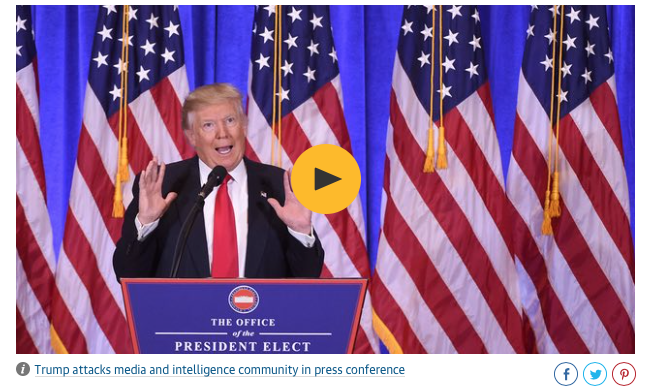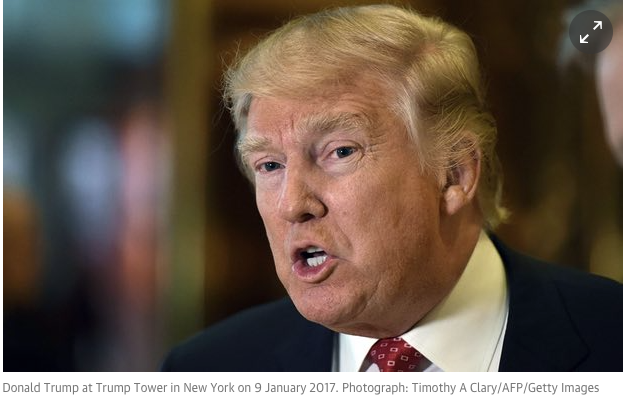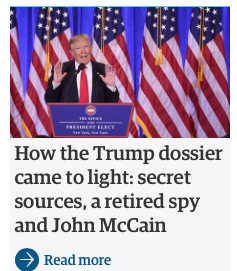The dossier includes lurid details from Trump’s 2013 visit to Moscow and claims an ‘extensive conspiracy’ between his team and the Kremlin – is it true?
CLICK IMAGE ABOVE for direct link to story in The Guardian.
The big picture
What does the dossier which John McCain passed to FBI chief James Comey say?
It says Vladimir Putin’s Russia has been “cultivating, supporting and assisting Trump for at least five years”. Moscow’s aim is “to encourage splits and divisions in the western alliance” and to upend the “ideals-based international order” set up after the second world war. Putin’s preference, according to the report, is for a return to the “Great Power” politics of the 19th century, where big states pursue their own interests.
The dossier says that Trump was offered “various sweetener business deals” by the Kremlin, but turned them down. The Kremlin also supplied Trump with “a regular flow of intelligence”, including on the Democrats and other political rivals.
Russian spies put together compromising dossiers on both Clinton and Trump, the dossier says. The Clinton one was innocuous and mostly included bugged conversations.
The Trump material, by contrast, was explosive. It includes lurid details from Trump’s visit in 2013 Moscow for the Miss Universe beauty pageant. According to the dossier, Trump stayed in the Ritz Carlton hotel, in the same suite used by Barack Obama. It says Russia’s FSB spy agency obtained compromising sexual material – kompromat – from the hotel suite. “FSB has compromised TRUMP through his activities in Moscow sufficiently to be able to blackmail him,” it says.
Is it true?
No one could quibble with the report’s section on geopolitics. It’s undoubtedly true that Putin has sought to weaken western institutions and the transatlantic alliance, plus the EU. Over the past 16 years he has sought to re-establish Russia as an indispensable global player, and to challenge what Moscow sees as unfair US hegemony.
The sex claims about Trump are ultimately unknowable and what happened inside the Ritz Carlton is a matter of speculation. Trump dismissed the report in its entirety at his press conference on Wednesday as “fake news”.
CLICK IMAGE BELOW for link to video.
“It’s phoney stuff. It didn’t happen,” he said. He also suggested that he was well aware that spying can go on in hotels, including in Russia. “I’m extremely careful. I’m surrounded by bodyguards. In those rooms you have cameras in the strangest places. You can’t see them and you won’t know,” he said.
Putin’s spokesman, Dmitry Peskov, denied on Wednesday that Russia collects compromising material. This is untrue. In 1999, Russian TV showed footage of Russia’s prosecutor general, Yuri Skuratov, in bed with two young women. Skuratov had fallen out with Russian’s then president, Boris Yeltsin. The head of the FSB at the time told a press conference that the recording of the orgy was genuine. His name? Vladimir Putin.
The sources
What does the dossier say?
The dossier quotes from a large number of anonymous sources. It cites “a former top level Russian intelligence officer still active inside the Kremlin”, “a senior Russian foreign ministry figure” and “a senior Russian financial official”. The report claims to have sources from inside the president-elect’s inner circle. We get code letters, but no names. For example, source G is described as “a senior Kremlin official”
The sourcing is one of the weakest aspects of the Trump dossier. Information inside Russia’s government and its spy agencies is tightly controlled. Putin’s own decision-making circle is extremely small. For example, his decision in 2011 to seek a third term as president was a closely guarded secret. If the report’s author is to be believed, he or she enjoys extraordinary access to figures at the very top of the Kremlin. This is possible, but unlikely. Cables leaked in 2010 from the US embassy in Moscow revealed that American diplomats struggled to find good sources in Moscow. Russia’s capital is a place where rumour, educated speculation, and planted rumour swirl and where even cabinet ministers don’t have the full picture.
The secret meetings
What does the dossier say?
It claims Trump’s personal lawyer, Michael Cohen, was the point-man for surreptitious meetings with the Russian leadership. It alleges that in late August or early September 2016 Cohen flew to Prague, where he met Russian officials at the offices of Rossotrudinichestvo, a Russian government cultural organisation.
Additionally, the dossier alleges that Trump’s foreign policy aide Carter Page visited Moscow in July 2016, where on 7 or 8 July he held a secret meeting with Igor Sechin, head of the Russian state oil company Rosneft and Putin’s de facto deputy. The report says that Sechin said that future energy deals depended on a Trump administration’s willingness to lift sanctions, imposed by the Obama administration in 2014 after Putin annexed Crimea.
The dossier claims that Page also met Igor Devyekin, a senior official from the presidential administration, who indicated that the Russians had kompromat on Clinton and Trump, and allegedly added that Trump “should bear this in mind”.
Is it true?
Cohen says he has never been to the Czech Republic. He says that he and his son were watching a baseball game in the US on 29 August, a date suggested for the secret rendezvous. Reporters from the New York Times and Washington Post have been to Prague. Thus far, they haven’t been able to verify the story. Czech intelligence officials probably won’t confirm it – if it ever happened – and will be reluctant to antagonise the new US administration.
Page’s visit to Moscow did take place. Who precisely he met there is unclear, though Page has denied seeing Sechin, and has described allegations that he met Russian officials as “complete garbage”. An American oil industry consultant, Page has trenchantly opposed US sanctions on Russia. Trump was asked at his press conference if his team had had any contacts with Russian officials. He didn’t give an answer.
The hacking
What does the dossier say?
It claims there is an “extensive conspiracy” between Trump’s campaign team and the Kremlin. The plot was sanctioned at the “highest level” and involved Russian diplomatic staff based in the US. It adds that Russia was behind the hack of Democratic National Committee (DNC) emails and released them to WikiLeaks for reasons of “plausible deniability”. The dossier says information went in both directions: Trump’s team used moles within the DNC as well as hackers in the US and Russia. The report claims that the Trump campaign fed back to Moscow details on Russian oligarchs living in the US and their families.
Is it true?
Some of the detail is questionable. But the report’s broad conclusion – that Russia was behind the hack of Democratic emails – corresponds with what US intelligence agencies believe. The CIA and FBI have both said publicly that the Kremlin covertly interfered in the US election in order to damage Clinton and help Trump. Obama agrees, and late last month expelled 35 Russian diplomats from the US, all of them intelligence officers. The move was taken in response to what Obama said was a cyber-attack by Moscow. He promised further steps, and sanctioned Russia’s military and civilian spy agencies, the GRU and FSB. On Wednesday Trump said Putin was guilty of hacking. Trump said: “He shouldn’t be doing it.” But he suggested the hacking would stop once he became president.
The errors
What does the dossier say?
It refers several times to the “Alpha-Group” of companies. This a basic and inexplicable error. The prominent consortium headed by the oligarch Mikhail Fridman is the Alfa Group. Fridman also runs Russia’s biggest private bank, Alfa Bank.
Is it true?
The spelling blunder dents the report’s credibility. Anyone with genuine intelligence about Fridman and company would get Alfa right. We don’t know if the report’s author has ever lived in Moscow, or speaks Russian. The use of “Alpha” suggests the author hasn’t been to Russia recently, and/or that his or her knowledge of the country is second-hand.
The deal on Ukraine
What does the dossier say?
It says that in return for hacking the Democrats, Trump agreed not to mention Russia’s covert invasion of Ukraine. The issued would be “sidelined”. Instead, Trump would focus on US/Nato defence commitments in the Baltics and eastern Europe. The aim: “to deflect attention away from Ukraine, a priority for PUTIN who needed to cauterise the subject”.
Is it true?
Trump said his administration might recognise Russian ownership of Crimea. He suggested that the US should not automatically honour its Nato commitment to defend the alliance’s members, including the Baltic states. He also urged the Kremlin to hack Clinton’s emails. In August, Republican party officials deleted a draft platform calling on the US to give weapons to the Ukraine’s government, which is fighting Kremlin-backed rebels.




You must be logged in to post a comment Login